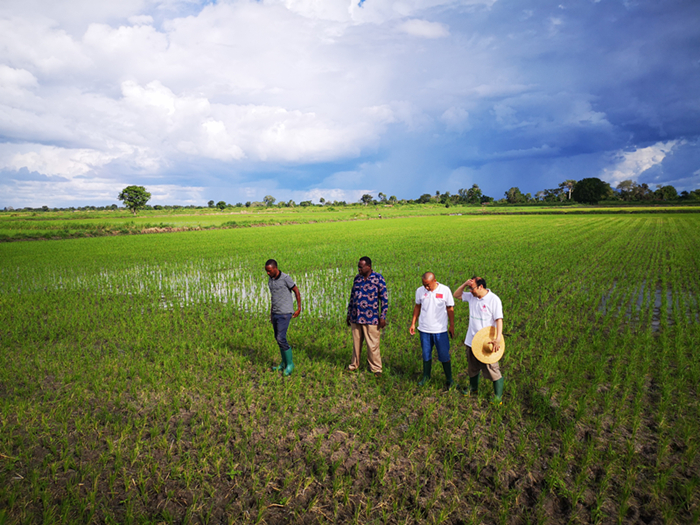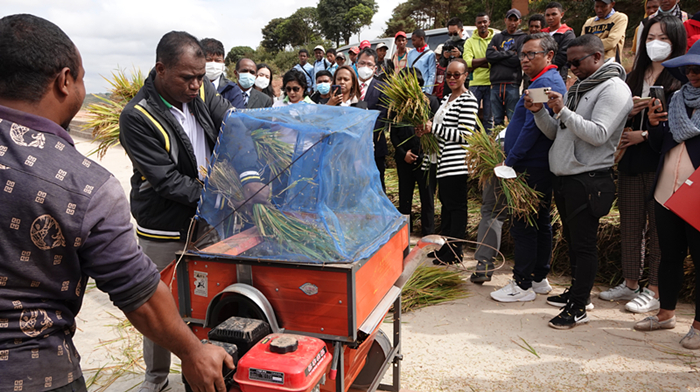
Wang Qian (right), director of the Demonstration Centre of China Agricultural Technology in Tanzania, and Salum J. Mbego (second left), expert from the Tanzania Agricultural Research Institute Dakawa Centre, inspect technical issues in the2,400-hectare rice cultivation demonstration field in Dakawa Township, Morogoro Province, on April27, 2021 (WANG QIAN)
Koné Zaogotia is a happy woman because she and another 323 women farmers in her farmer group Kparatiogo de Mananama in Kolia Township in north Côte d’Ivoire do not need to do heavy manual work on their 7-hectare paddy field.
Thanks to a tractor, a peeler and a thresher provided by the China Africa Rice Value Chain Development Initiative, it is much easier for them to plant and harvest rice. What they need to do now is to plan how to better make use of their land, while leaving the ploughing, sowing and harvesting to machines.
" It's a great help to us [women farmers] and we feel much relieved. In the past, we had to plough the plots manually, which is very tiring," said the 50-year-old secretary general of Kparatiogo de Mananama. They also receive fertilizer and, more importantly, training on farming skills from the programme every year.
Three other farmer groups, including Kahatana of Kantara in Boundiali Township and Nion-Kagnon des femmes de Nakaha in Komborodougou Township in north Côte d'Ivoire, the third-largest rice producer in West Africa, joined the China Africa Rice Value Chain Development Initiative in 2021 and gained the same support from the programme.
This initiative was launched in March 2021 by the World Food Programme Centre of Excellence for Rural Transformation (WFP China COE) and Regional Centre of Excellence Against Hunger and Malnutrition (CERFAM). It is a Global South-South Development Centre project aiming to facilitate South-South knowledge sharing, mutual-learning, as well as technology and expertise transfer on post-harvest loss management to enhance rice value chain.
"Today, our warehouse capacity is not enough to store all of our produce. We wish to increase our warehouse capacity through the initiative so that we could improve our rice storage," said Zaogotia.
Knowledge exchange
This issue was discussed at the Second Seminar on China-Africa Rice Value Chain Enhancement, which is an activity contributing to the initiative, held on September 7-8 in Jiaxing City, southeast China's Zhejiang Province. The seminar aimed to provide a platform to link partners from China and African countries to exchange views and insights, especially on rice processing, storage and quality control.
Statistics from the Alliance for a Green Revolution in Africa (AGRA) show that rice is the important staple food in Africa, with a projected consumption of over 34.5 million tonnes annually by 2025, up from 11.6 million in 1996. "However, even though rice is produced in 40 of Africa's 55 countries [and regions], the quantities are often too little to meet the local demand. The deficit is bridged by imports," said Agnes Kalibata, president of AGRA.
West Africa imports 40 percent of its rice for consumption, with rice inflows into the region accounting for 18 percent of the global imports.
"This seminar, therefore, is timely because it gives us, African countries, an opportunity to share ideas with China - the largest rice producer in the world with 30 percent of the global production," said Kalibata. "Through this seminar, we have an opportunity to learn how China has been able to consistently produce nearly 650 billion kg of grain annually.”
Meanwhile, the WFP China COE recently launched the WFP-China South-South Cooperation Knowledge Sharing Platform and Cloud School to offer in-depth, comprehensive and continuous courses on agriculture-related knowledge.
"We facilitate knowledge exchange through the platform and also the cloud school. We are confident it will enhance the rice value chain in Africa," said Qu Sixi, representative and country director of WFP China Office.

Farmers learn how to use a thresher in a high-yield hybrid rice demonstration base aided by the Chinese government in Andranovaky Village, Madagascar's Analamanga Region, on May 6 (COURTESY OF YUAN'S MADAGASCAR AGRICULTURAL DEVELOPMENT)
Sustainable production
In fact, China-Côte d'Ivoire cooperation in rice farming had started prior to the launch of the China Africa Rice Value Chain Development Initiative.
In June 2020, CERFAM visited a demonstration site in south Côte d'Ivoire, which was created by a group of Chinese experts in 1995. During the visit, Chinese experts provided technical assistance and training in seed production, rice growing, and irrigation.
To improve the mechanisation of rice production and processing in Côte d'Ivoire, some Chinese equipment was procured under the China Africa Rice Value Chain Development Initiative, and a four-day virtual training was also organised by Chinese experts on the operation of the equipment as well as the relevant techniques on rice threshing and processing.
Supported by this initiative, and with the use of the machines, the yield at the demonstration site in north Côte d'Ivoire has increased to about 3.5 tonnes per hectare, reaching 61.6 tonnes for 17.6 hectares of land per season, whereas the figure was 11 tonnes in the 2020-2021 season.
"African countries in general and Côte d'Ivoire in particular are counting on innovation based on China's experience to transform our predominantly family-based agriculture into industrial agriculture," said Gomun Kouya Bertin, commercial counsellor at the Embassy of the Republic of Côte d'Ivoire in China. "Hence the Sino-African agricultural cooperation in the rice value chain is needed to stem bottlenecks such as expensive machinery, weak agro-food processing capacity, lack of agricultural training centres, etc.”
As the neighbouring countries are also facing similar challenges in rice production and post-harvest management, this practice could be introduced to develop their rice value chain. It is planned to scale up the initiative in Côte d'Ivoire and replicate in Guinea for a greater impact on the rice value chain development in West Africa.
"China and Africa have a long history of comprehensive cooperation in eliminating hunger and achieving the UN Sustainable Development Goals," said Rahamtalla Mohammed Osman, ambassador of the African Union to China. "Such collaboration was further cemented through the milestone Dakar Declaration of the Eighth Ministerial Conference of the Forum on China-Africa Cooperation in 2021, with dedicated provisions on agricultural and food security cooperation. Agricultural technologies and experience from China, especially on the rice value chain, have been shared through those activities.”
Source by ChinAfrica magazine
http://www.chinafrica.cn/Homepage/202209/t20220922_800307451.html
Category
China-Africa Cooperation on Rice Value Chain Creates Brighter Prospects for Food Security
Contributor
China-Africa Cooperation on Rice Value Chain Creates Brighter Prospects for Food Security
Country
Story

